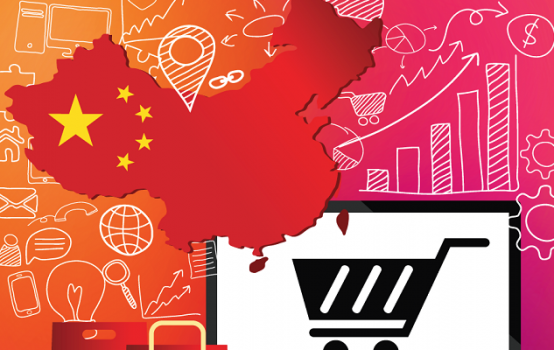Chinese traveling user generated content platforms: Mafengwo vs Qyer
” 世界那么大,我想去看看 ” ( There is such a big world that I would like to see it all ) is a sentence once written as the reason for resignation and later suddenly became a buzzword on Chinese social network.
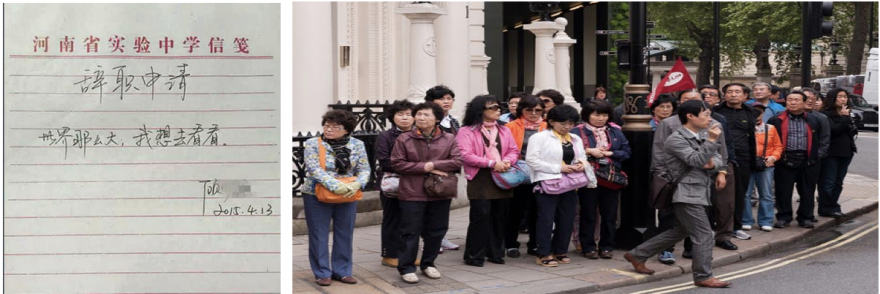
These years, more and more Chinese prefer independent travels to package tours. Especially, the grown up 90s generation, who are highly individualized and strong-minded, has become the main E-consumers of those traveling user generated platform such as Mafongwo and Qyer.

For example, Miss Xian, a traveling platform user from the 90s generation living in Guangzhou, China, gave up package tours for more alternatives a couple years ago. She had already stepped in South East Asia, America and Europe. Her preference is well organized in-depth trip with her family. Since her husband is too busy to do the planning, Miss Xian is responsible for handling it all. “Every time I am planning for a trip, I need some suitable travel platforms which offer practical and comprehensive reference for my destination. These years, I have been using mostly Qyer and Mafongwo interchangeably.” she said.
WHAT ARE MAFENGWO AND QYER EXACTLY?
Mafengwo : A Dream Realizer Started With A Community

In 2006, Chen Gang and LV Gang who worked in Sina and Sohu respectively set up this online travel community for their interest in traveling around and sharing travel pictures. 10 years ago, when independent travel was still a niche, mafengwo.cn accumulated users and contents through word-of- mouth. In 2010, they officially started commercializing mafengwo.cn. Apart from traditional OTA mode, they wanted to earn profits from existing contents directly.
By 2017, mafengwo.cn has gained over 100 million members, 80% of them are from mobile apps “ Mafengwo Independent Travel “. By Oct. 2016, according to the second quarter financial results of OTAs (Online Travel Agency) , Ctrip, Qunar, Tuniu, the top OTAs in China, were all in varying degrees of financial loss, while mafengwo.cn announced a turn from loss to profit eventually.
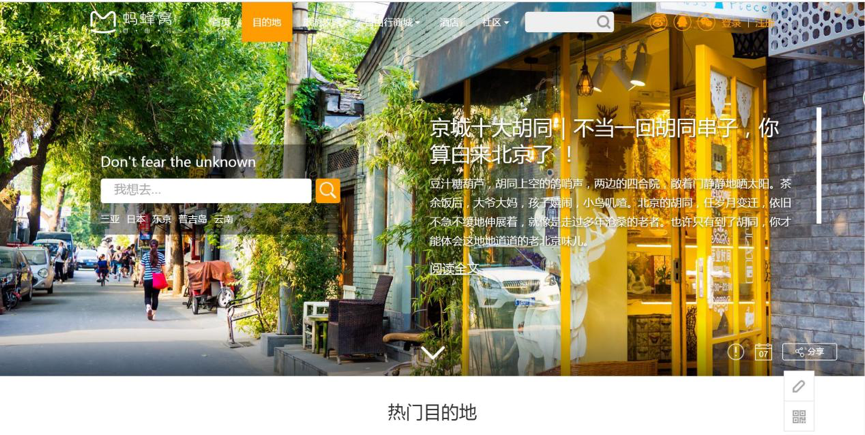 Nowadays, mafengwo.cn has become an UGC (user-generated content) platform where Chinese can share photos, travel notes, journals and Q&A online. It targets Chinese domestic users and independent travelers who need tourist reference, destination ranking lists and other recommended to-do things for their trip planning. Right now, 3,000 journals, 5,000 Q&A, 10,000 comments, 100,000 footprints are generated daily.
Nowadays, mafengwo.cn has become an UGC (user-generated content) platform where Chinese can share photos, travel notes, journals and Q&A online. It targets Chinese domestic users and independent travelers who need tourist reference, destination ranking lists and other recommended to-do things for their trip planning. Right now, 3,000 journals, 5,000 Q&A, 10,000 comments, 100,000 footprints are generated daily.

Moreover, it integrates resources contributed by users to make travel advice books among global destinations. Those books have been downloaded over a hundred million times.
Qyer : A Digital Bible for Chinese Backpackers
There are many other similar small-sized UGC communities in China market but a well-known competitor within Tourism Community category is Qyer.
 At the very beginning, Qyer was set up by Xiaoyi in a dorm room. He was an international student studying in Hamburg, Germany in 2004. Once, after he got stolen at the airport while he was traveling in Europe, he became a real backpacker with very little money to survive. Then, he set up Qyer as a forum to better help oversea students share their experience, advices and wise tips of saving money during the trip. Then, Qyer started accumulating useful tips on the platform and became more and more popular in China. Within four years, Qyer had gained more domestic than oversea users. Therefore, Qyer moved back to China in 2008 and received strategic investment from Alibaba in 2013.
At the very beginning, Qyer was set up by Xiaoyi in a dorm room. He was an international student studying in Hamburg, Germany in 2004. Once, after he got stolen at the airport while he was traveling in Europe, he became a real backpacker with very little money to survive. Then, he set up Qyer as a forum to better help oversea students share their experience, advices and wise tips of saving money during the trip. Then, Qyer started accumulating useful tips on the platform and became more and more popular in China. Within four years, Qyer had gained more domestic than oversea users. Therefore, Qyer moved back to China in 2008 and received strategic investment from Alibaba in 2013.
 Right now, Qyer aims at making oversea traveling more convenient and cost-effective for Chinese. Meanwhile, it does offer information for domestic destinations but these contents usually do not show up on its homepage.
Right now, Qyer aims at making oversea traveling more convenient and cost-effective for Chinese. Meanwhile, it does offer information for domestic destinations but these contents usually do not show up on its homepage.
WHAT ARE THE DIFFERENCES BETWEEN MAFONGWO.CN AND QYER?
The intriguing fact is mafengwo.cn and Qyer seem to intentionally keep in balance in the market. Mafengwo.cn puts more effort on domestic traveling, while Qyer mainly focus on travelling abroad. There is even a viral saying among the users: “Choose Mafengwo in-bound, Qyer out-bound”
In conclusion:
Traveling users generated content platform is difficult to develop and gain profit. It requires long-term user loyalty and content accumulation without guarantee for commercialization. But the potential of the UGC-big data commercial mode has already headed above water. With the huge amount of contents generated by users such as different links between accommodation reservations, attractions and dining recommendations, these data value mining is essential for breaking the barrier upstream and downstream. The one that’s faster to complete model transformation will be the winner.
Comparison/Platforms |
Mafengwo |
Qyer |
Traffic & loyalty |
More traffic and relies more on search engine optimization (SEO marketing). |
Less traffic but more users’ loyalty since the demand frequency of overseas traveling is less than domestic traveling.Qyer’s strategy is based on a “members get members” type of expansion. |
Targets |
Both target youngsters between 18 and 35 who prefer independent travel. Qyer also targets backpackers. |
|
Focus |
Mafongwo.com focuses on users sharing by creating topics and activities to encourage users to post their journals |
Qyer emphasizes user-to-user communication by operating its forum and offering appealing interactive promotions both online and offline.For instance, Qyer has already launched Q-homes in Chiangmai (Thailand) and Tokyo (Japan), which are offline bases offering Chinese-speaking comprehensive services. |
Functions |
The main functions are similar. They both offer travel journals, tips books, Q&A, top destinations and commercial functions.But Qyer has developed several apps for users convenience, such as ” 行程助手 ” (Itinerary Assistant), which helps users to make a detailed itinerary by automatic generation and manual setting. It collaborates with Booking.com( a hit for overseas accommodation reservations) for users to simply add reservations in the itinerary or book directly from Booking.com. Transportation settings and automatic distance calculation are also included in the sites. Moreover, it provides 2 ways to output itinerary: (1) A document fits with Visa requirements (2) A huge PDF itinerary books including all the photos or tips, details of each chosen accommodation reservations, transportation, attractions and restaurants. |
|
Home Page quality |
Update more often |
Update less often and there are even some journals from last year. |
[recent_posts count=”3″ date=”true” thumbnail=”true”]
5 Bugs To Avoid When Doing E-Commerce In China
Have you ever tried to build a new overseas brand and fail in your attempt? In any approach to China, foreign brands often make some common mistakes when trying to sell their products in China mainland. Although such misconceptions are not exclusive to online environment, we will focus on those that particularly affect your approach to e-commerce in China. China is already the world’s first e-commerce market.
Are you going to miss its enormous potential?
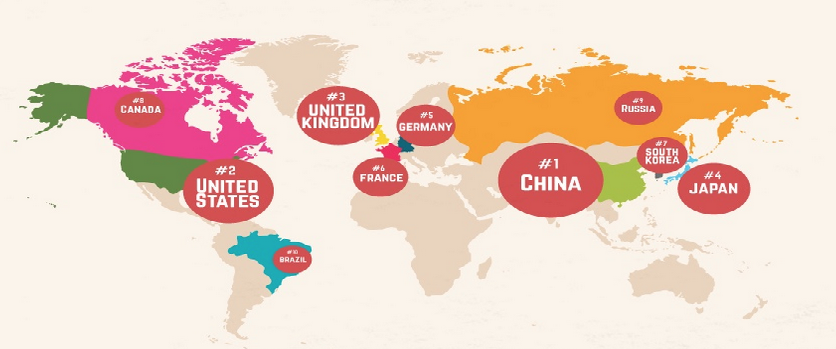
First bug: China is mobile, and you better record it
It is not the first time we tell you this, and for sure it won´t be the last. As we mention before in our article “How to Take Advantage of the Latest Ecommerce Revolution?”, Ecommerce has been a great revolution for both companies and customers.
Nowadays, Chinese prefer to use their mobile devices rather than their laptops and according to the new trend, companies have already starting to adapt themselves to portable devices. Moreover, those companies using U-commerce are focused on improving the customer experience through customizing and navigation created in cooperation with the User.
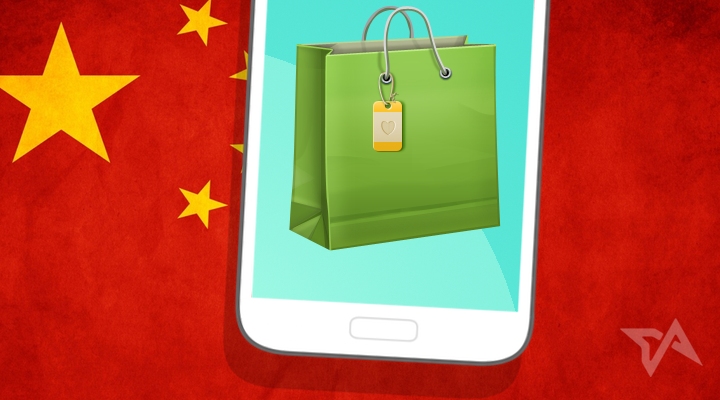
Second bug: E-commerce may be an asset in your country, but in China is irreplaceable
We cannot fail to mention Frank Lavin, CEO of Export Now, when he says,
“In China, Ecommerce is the cake.”
This may mean that you will need to adapt your business to the new environment. Do not expect it to be China who suits you, this does not work this way.
Remember that whoever hits first, hits twice. Embrace e-commerce as the enabler of your business it is, and take advantage of the immense benefits that electronic commerce can bring to your company to start selling around the World!
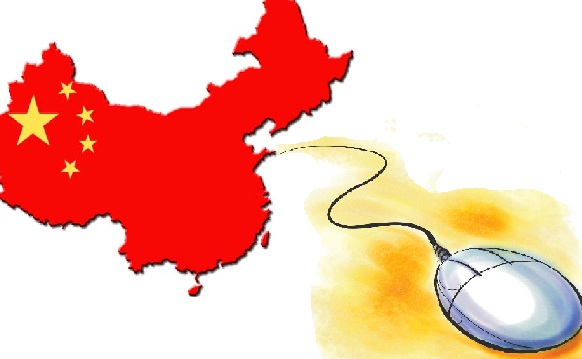
Third bug: Social Media is there to stay. Register your account and start moving!
Surely you’ve never heard the words Baidu, WeChat and Weibo… and let us tell you that you have a huge problem in China.
Not only around the 93% of the online searches in China are done in their own search engines –Have you ever heard Google does not work in China?– but also about a 68% of the customers take a look on the official Social Media account before buying.
Do not miss the opportunity to have a voice in that huge chicken coop is the network, start developing a tailored communication strategy for your brand and gain your piece of the cake!

Fourth bug: Domestic and lazy thinkers, or how the triumph from a day doesn’t make it daily
Do you think you will keep doing in China pretty much the same things you were doing before and as a result you will achieve success?
A basic rule you should never forget again is, no matter the experience and the many different markets in which you have entered before, is that new horizons always implies a new starting on your understanding of the target, so we definitely encourage you to start a market analysis.
Will your brand be competitive in China?
Do you offer something different regarding your competitors?
Is there a suitable market niche in the country ?
These and a thousand more questions require a prior discussion, keeping in mind that China should not be underestimated: the country enjoys some peculiarities you definitely must know before starting your landing.
We strongly recommend you seek assistance from professionals focused on the Chinese market, in order to enhance your chances of success in the country.

Fifth buf: Do not try to do everything by yourself, ask for advice
We are not tired of saying it, and will do so again: China is not a flat road. Do not try to embark on this mission unaccompanied, but pick very well with whom.
Look for complementary partners interested in joining forces, go to Government agencies dedicated to external actions and internationalization and definitely search for specialized agencies in the country to start outsourcing some tasks.

Already in search of a consulting expert in digital marketing and e-commerce? You have come to the right place.

China And The Ripple Effect On The Global Stage
What are the risks that could arise from the economic slowdown in China? How does China affect to other countries? Since starting its market reforms almost thirty years ago, China´s currently economy cannot be ignored.
Even if China has not left behind its centrally-planned economy yet, it has introduced some big measures to turn into a market-based country. Such efforts have resulted in a huge GDP growth and has lead the country to reach all the Millennium Development Goals by 2015.
Currently China has become the second largest economy in the world, but deals the first in the ranking by the quantity of goods and services produced. Moreover, according to the expectations published by the International Monetary Fund (IMF) for the present year, China will be responsible of the 18% of the entire World economic activity.
If to all this we add the expectations of its huge and richer population, its rapid change on production models and its consequent role on the World stage, we can conclude that the importance of China in the world has become a matter of vital importance in today’s global interregional balance.
But its big hits cannot make us forget that China still remains a developing country, and as we have mentioned before on our article “Ten Challenges on Chinese Future“, not only market reforms are incomplete, but also it has huge challenges ahead which must start to face.
After the financial crisis of 2008, neither the business community nor Governments have fully restored their confidence on the global economy. The doubts about the economic bonanza and the future role of Western countries have underestimated the increasing influence capacity of China in the international arena, while doubts have generated certain fear of a possible blowout of the country.

Trade effects are a game changer
The channels through which China affects the global economy can be summarized on:
- Decrease in trade and exchange rates
The Chinese leadership on trade makes hard not to affect global demand. China’s import volumes keep growing, but less than expected. This becomes a huge problem to those countries dependent on Chinese exports: raw materials are highly susceptible of the slowdown.

This effect creates a bidirectional paradox: China affects the world as much as the world affects China.
Although there has been much speculation about a possible future depreciation of the RMB in order to relaunch Chinese exports, in the team we believe that a currency war is currently off the table.
- Oil lower prices and commodities
The latest drops in oil prices are caused by the lack of confidence on Chinese economy. Its weakness has led to enormous imbalances on exporting countries of crude oil and raw materials: Russia, Brazil, OPEC countries and the U.S. still suffer for it. China’s falling demand has greatly contributed to the new situation and with it, deflation has knocked on the door.

However, according to the latest analysis made by the IMF, the negative effects are supplemented by growth in the purchasing power of the population. The Organization still thinks that lower prices on commodities have a positive effect on general economy.
- Monetary and inflation policies
The recent affordability of RMB should not make us forget that Chinese weakness can lead to a global new paradigm surrounded by deflation and debt. Once again, lower prices stimulate consumption, and this leads to boost demand, bigger sales and prosperity. Lower prices have become the stimulus of global economy.

- Cultural hegemony
Even if the Western countries have underestimated China’s rise, the consequences can already be seen. Although Cultural power follows to Economy and Politics, China already shows its increasing political and cultural power on international arena: mandarin language and Chinese diplomacy have become a key to Government policy.

Its empowerment is more visible in East Asia, but runs fast around the rest of the world. We have started living in a China-centrism, in which global power gravitates around Chinese policy.
Nowadays, confidence in the global economy is vital for prosperity but unpredictable. The ripple effect that is lived in the global area, is greater than ever.
Understand this huge spider web which is China, seize opportunities to launch your business and boost your sales, are our goals.
In search of a Digital Marketing Consultancy? Interested on Chinese Ecommerce?
Visit us on 2 Open. We would love to hear from you!
10 Challenges On Chinese Future
Any approach to Chinese landscape ends falling into the same debate: Will China evolve or break over the next years?
Although experts do not agree (And neither do we!), in the team we believe it is important to name some of the most immediate challenges ahead for China.
Current challenges are also the challenges of the future
When we talk about China, no one agrees. The huge boost experienced by China in the last thirty years has not buried the doomsayers who year after year have sown doubts about the future of China. Faced with them there are some enthusiasts who proclaim that the next world leadership belongs to China. Who has the reason? Not everything is white, not everything is black. Both sides are right.

Reforms, Where to start? Ten points to keep in mind
China is characterized by the dynamism that has developed in recent years. In order to ensure the future growth of the country, Chinese authorities must address some issues of particular importance:
First, Local Government Debt:
Local and regional government debt have been a terrible headache for analysts. We would like to underline the explanation Nicholas Zhu, senior analyst at Moody’s, gave,
“For the local government direct debt, we believe the government is finding a handle by capping it at 16 trillion yuan ($2.45 trillion) overall and improving the structure by swapping some existing debt into bonds at lower cost and longer maturity.”
However, in recent times the central bank started to allow qualified individual investors to buy and sell the bonds through commercial banks.
Second, Reform State Companies:
The Government is attempting to reform the state-owned sector while continuing to maintain its currently control. To do this, some different attempts have been made, such as: mixed formulas, restructuring, mergers, open up protected service sectors to private and foreigners, them all focused on enhancing their competitiveness and autonomy on private-sector markets.
Third, Liberalize the Financial Sector:
Financial liberalization is a key in Chinese reform, and it is closely linked to the privatization phenomenon itself. Both reforms will be needed to maintain Chinese growth, and facilitate the creation of jobs and the reliably channels credit to companies. The success of economic reforms carried out, will be a determining point of stabilization or social destabilization, and are a sensitive issue in governmental action. As the country opens its doors further, as the former Australian ambassador to China, Geoff Raby said,
“Equally China will be more open to capital inflows.”
Fourth, Investment:
Investment in China is drived by Foreign Direct Investment, as a key which gives advantages to the supplier and also to the host. Moreover, is a thermometer of the future of the business, and China has already started to capitalize its benefits. At the same time, FDI depends on some key – factors:
- Capital Availability: China is already the world’s largest recipient of foreign capital.
- Competitiveness: Rests on the country’s capacity to develop its infrastructure, resource availability, productivity and workforce skills.
- Regulatory environment: A difficult legal doctrine and excessive regulation, have been a serious handicap for investment in China. Things are changing, but it is still far to be as it should be.
- Openness to trade –especially international one.
Fifth, Deflation:
To achieve the Chinese structural goals, it is a necessary condition that the country’s growth rate is maintained over 5 years above 6.5%. Moreover, in China Dollar strength prevents avoid closing 2016 with deflation, and has contributed to high capital outflows in recent years.
Sixth, Chinese Demand for Hard Commodities:
A very important point to consider for countries that produce raw materials as iron, copper or aluminum. Its prices will drop sharply as long as its demand will go slower. This expectation is opposed to food, which will keep increasing due to the growth of Chinese middle class.
Seventh, Manufacturing:
China´s export competitiveness are based on three main principles: low unit – labour costs and interested rated, and an undervalued yuan. Due to the paradigm shift, it is expected that China’s strength at this point has begun to crack; an opportunity for others countries after all!
Eighth, Innovation:
Over the past five years, China has promoted with great vehemence its innovative sector. The technical, economic and human development are impressive, especially its efforts in Science & Technological graduates. According to Mckingsey Global Institute,
“China must generate two to three percentage points of annual GDP growth through innovation, broadly defined. If it does, innovation could contribute much of the $3 trillion to $5 trillion a year to GDP by 2025.”
Nineth, Environment:
China lives in a permanent Environmental crises: air and water pollution, deforestation and desertification, biodiversity, high rates of cancer and the growth of a middle-class who is adopting a Western –style consumer patterns have become a huge problem for future. China needs to change the course of its current model. Therefore, he has embraced renewable energy.
Tenth, Consumption:
We cannot talk about Environment without mention Consumption. The sharp increase of in domestic consumer patterns and the Chinese middle-class prosperity, will need of a sustainable and growing consumer economy based on the need of big service sector reforms.

Companies must be ready. How to be competitive in China?
The rapid evolution of the world stage precludes long-term estimates. Having an updated database and the example of a specialized agency, is always a clear advantage in any approach to the market, but even more in China. It has never been enough for global business to know what is coming, but also knowing how to take advantage of every opportunity that arises in the market.
In search of a specialist Agency in the Chinese environment? Are you interested on Digital Marketing and Ecommerce?
10 Things you Need to Know to Build a Chinese Website (Part 2)
In the first part of this article, we showed and identified 5 main points that differentiate a Chinese website from its western counterpart that we need to keep in mind in order to build a good one.
Let us summarize some of the main points addressed in the previous article:
- The style, design and structure are more complex and with much more information in opposition to the cleanness of the western websites
- In terms of user experience, Chinese are used to a great amount of links and keyword search boxes are the kings for navigation purposes
- Where to host your Chinese website is one of the first decisions to make. The most of the times we advise you to have a hosting in China. For that you will need a Chinese company to apply for an Internet Content Provider (ICP License)
- The Chinese Great Firewall blocks all websites that do not meet the content requirements that marks the Chinese government
- Your website needs to be ready to integrate with the main Chinese players. Google, Facebook and friends are banned in China; instead you will need to use the BATs (Baidu, Alibaba and Tencent).
After this little updating, we would like to further develop this post showing you 5 more crucial things to take in consideration when building a good Chinese website.
When building a chinese website, What else should I know?
6 – CHINA IS MOBILE. BE RESPONSIVE
Adapting our website to mobile is very important in any country, but in China is mandatory.
The Smartphone is, in many cases, the only way they have to access the Internet. Therefore Chinese users are much more familiar with the use of mobile devices. Keep in mind that almost the 50% of all Ecommerce transactions made in 2015 were done via mobile, compared to the also quite high 22% in the United States.
Don’t think any longer and start working on a nice mobile design… Mobile first!

7 – DOMAIN. WHICH ONE IS THE RIGHT OPTION FOR ME
In your approach to domains, three are the main options:
– Not that long ago, to have a .CN was a must. It was not possible to get it if you didn’t have a Chinese legal entity. This has changed over the time and now you can easily get a .cn domain, no matter where your company comes from, just providing a copy of your Company’s ID. As the Chinese international top level domain, your brand might be perceived as having a strong presence in China and might also bring some trust
– On the other hand, we have the .COM domain. Chinese Internet users are increasingly getting used to this domain. Major Ecommerce platforms like Tmall.com, JD.com or Sunning.com may bear much of the blame for this. It can be very good for foreign companies trying to sell their products in the Asian giant to have a .com domain as it might help to highlight the international feel of the brand
– .COM.CN is the ugly duckling in the middle still in use by many brands mixing the good things from the previous mentioned domains, but without reaching their full advantages. In any case it can also be a good solution.
Which language should I use?
Another point to think about is the language to be used. Does your brand have a Chinese name? Then you can also use its pinyin term. Pinyin is the romanization system for standard Chinese: Chinese search engines recognise the pinyin words in the URL and then link them to what they stand for in Chinese characters in order for the website not to lose coherence.
Our advice?
Don’t get crazy about the domain, they are usually not that expensive. So, in case you can afford it, try to get the three of them (.com, .cn and .com.cn), plus their pinyin variants and redirect them to the main one; depending on your strategy.
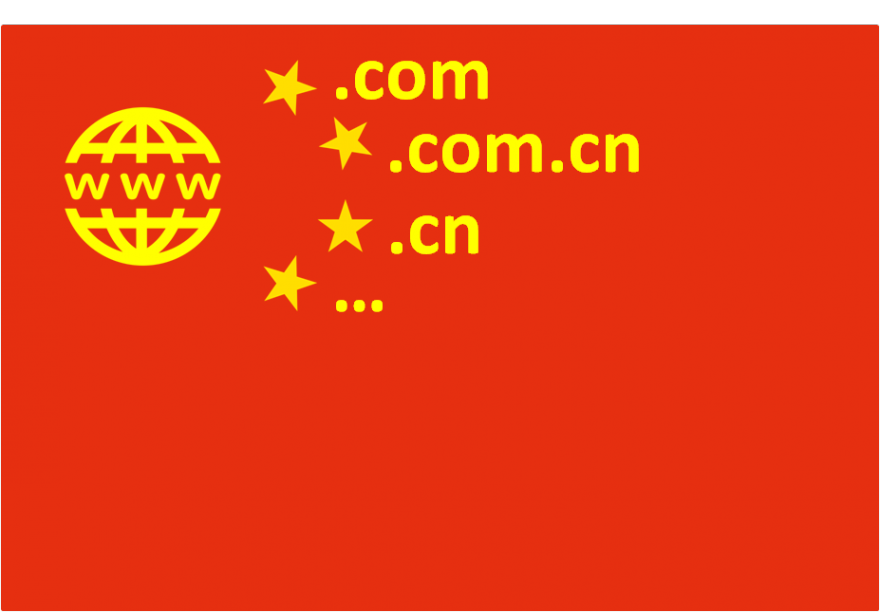
8 – CONTENT. DON’T GET LOST IN TRANSLATION
It is important to know very well your main target markets as the language will differ depending on it. It might be obvious to mention it, but it wouldn’t be the first time that a company’s target consumer is in Hong Kong, Taiwan or Macao and the language used for the website translation was simplified Chinese instead of traditional Chinese and the other way around. That is a major and silly mistake that takes a long time to revert.
I don’t want to mention either the fact that a Google translated web does not help at all, but I am doing it because I have seen too many. It is mandatory to let a professional team take care of the translations. In 2 Open we separate this process in three parts:
- Translation, interpreting the main message that the customer wants to transmit to the final customer, done by a marketing professional in our team
- External review, done by a professional translator outside the team
- Final review, done by another marketing professional in our team
You might not believe it, but in certain cases we still get minor complaints. This is because Chinese language can be interpreted in many different ways. Therefore translations are always a difficult point in the list.
Is Customization a mandatory requirement?
Let’s not forget about the Chinese cultural customization. Website localization embraces translating and localizing a site into different languages making sure all content (text, images and videos) is translated correctly in an accurate, cultural and technical manner.
As stated before when talking about content, we are also talking about images and videos. There are no written rules and it has similarities to the domain section we discussed above. There are brands like Nike or Zara that prefer to maintain their international feel using western models in their multimedia strategy. Many young Chinese users welcome this method, but not all of them. Depends on the strategy you want to follow.

9 – PAYMENT OPTIONS. CREDIT CARDS? NO, THANKS
In the previous post, we wrote about the BATs (Baidu, Alibaba and Tencent). In China, the online payments market is currently dominated by two of these two tech giants – Alibaba’s Alipay and Tencent’s WeChat payment with 49.2% and 20% market share respectively.
These companies try to increase their market share by adding more brands and merchants within their ecosystem; something that both companies effectively handle. Also cash is king, as cash on delivery holds a strong position. The fast and vast adoption of electronic payments via mobile is likely to counter this trend in due time.
It is actually China and not the US at the leading edge of the trends towards mobile payments technology. Just for putting an example, both WeChat and Alipay have long used the now famous QR codes to let Chinese netizens pay for purchases and transfer money. It seems they have jumped over some natural technological development processes. This kind of behaviours can be quite normal in undeveloped countries that start to grow very rapidly.
What happened is that they adopted the mobile payment technologies even before implementing some existing ones as a huge percentage of the Chinese population accesses the Internet via mobile devices.
Another tip?
Get ready to integrate Alipay in your website as first and mandatory option. And seeing how fast Tencent WeChat payment is growing, that would be your second natural option.

10 – SEO
Once your website is ready, you will need to submit it to Baidu creating a Baidu Webmaster Tools account (only available in Chinese). That way Baidu will be able to index the site properly and your great Chinese adventure starts!
Search engine optimization done in Baidu is not so very different as the one you could do for Google. Anyway, we would like to note a few differences I think you need to know:
– Meta description – unlike Google and Bing, Baidu still uses Meta descriptions as a ranking factor. Keyword targeted description match users’ queries and their demands, which would help with the click through rate (CTR).
– Indexation – Baidu’s web crawling bot, Baiduspider, is not as advanced as the one from Google. As a result, you will need to help Baiduspider to discover and index your pages in different ways. Without mentioning that you can go to sleep and wake up with huge traffic losses or de-indexed pages usually caused by a penalization. Be careful what you do!
– Link building – On Baidu, it is not about the quality of the publishers’ website, it is more about the unique relevancy of the content (as it relates to your content) and the quantity of links to your pages. Baidu penalizes duplicate content and it also disallows irrelevancy. Authority and quality of the publisher is not that important (for now). In short, the more the merrier as long as it is not duplicate.
– Baidu services – Baidu offers a lot of different products apart of Search; use them and leverage their integrated marketing power. The most useful are Baidu Zhidao (questions and answers service) and Baidu Baike (Wiki service), but there are tons of other services that might be helpful to increase brand awareness and for content creation.

OTHER ASPECTS
As for the tracking, most people use Baidu Tongji and/or Google Analytics. Yes, you read it well; Google Analytics still works in China and it is the only Google service that still does. You will find many detractors, but for what we have seen there is no huge discrepancies between the data collected by both systems (usually not higher than 5%). And Google Analytics has more functionalities than Baidu Tongji.
It is also important to mention the typography. Chinese language is not easy to read due to the difficulty associated to its typography. With 40,000 characters, they are divided in strokes which amount can vary between 1 and 60. Therefore the font size should be at least 12px.

At 2 Open, we would be pleased to help you.Take the advantages the Chinese market offers.
With the cooperation of our Digital Marketing and Ecommerce Agency, China will be at your fingertips.
Do not hesitate to visit us We´d loved to hear from you!
This article has been edited by Paula Vicuña, from 2 Open.
How to use Tencent Penguin Intelligence in your approach to the Chinese market?
Are you looking for the latest news of Tech innovation in China?
The goal of this article is to shed some lights of why Penguin Intelligence is a work-tool to keep in mind on your approach to China.
Penguin Intelligence is the official data platform from Tencent Technology
Tencent Research Organization works such as a professional organization which publishes in-depth reports about the Chinese mobile ecosystem.
Penguin Intelligence performs research and advocacy concerning hot-topics. It also studies markets, trends and best emerging practices.
Their work is founded on a rigorous thorough understanding of every Industry Focus, Sector Dynamics, Case Studies, Data Analysis and Macro environment.
Penguin Intelligence is constantly optimizing the analytical model
Penguin Intelligence is your best choice if you want to figure out what is happening in Chinese Internet Industry. Unfortunately, their business analysis and reports are only available in Chinese for the moment.
Penguin Intelligence also counts with three original sub-columns:
- Penguin Investigation
- Penguin Analysis
- Penguin Portfolio
In addition, Penguin Intelligence includes an Open Platform, which is a huge cohesion of all wisdom from China technological business.
What will you find in Penguin Intelligence?
As we have mention above, Penguin Intelligence contains a full variety of reports, infographics and data.
There are more than thirty valuable Business research reports, hundreds of in-depth analysis reports that have been already published and the Platform keeps growing every day.
The influence of these reports / studies has touched up multiple areas of Internet and traditional industries.
Due to its importance, Penguin Intelligence currently enjoys high reputation and credibility in Governments and Enterprises.
To illustrate the kind of searches which can be done, from 2 OPEN we have compiled a brief list of some of the most striking examples that you can find on the Platform:
- In-depth reports and fresh data about Tencent ecosystem; WeChat public accounts: What type of articles get the most attention from readers?
- Many infographics and graphs about mobile ecosystem in China; iPhoneS sales in China
- Data about digital marketing customer behavior; Do customers prefer hongbao or discounts?
Relying on Tencent, Penguin Intelligence contains a large user base and massive data advantage of products in multiple fields:
- Social networking application: WeChat (Most-used application in China)
- Social networking service: Qzone, Tencent microblog, Tencent Video
- Instant messengers: QQ, QQ International
- Online payment system: TenPay (which is similar to Paypal)
- Cloud storage service: Tencent Weiyun
- Own search engine: Soso.com
- Media player: QQ player, QQ Music, KuGou Music, KuWo Music
- C2C auction site: paipai.com (now merged with JD.com)

The huge scale of Tencent Data is the cornerstone of Penguin Intelligence ability to mine and analyze data, and serving professional market insights and industry reports.
Do you want to discover a little more of Penguin Intelligence?
As a Digital Marketing and Sales Agency, from 2 OPEN we often suggest you to contact us for a deeper understanding of all knowledge Penguin hosts.
Do not forget to subscribe to our Newsletter to receive some special information about China!
This article has been edited by Paula Vicuña from 2 Open.
How will the “Brexit” influence China?
“It could be the darkest day in the history of European stock market.”
“Brexit”, the abbreviation of “British exit” that mirrors the term “Grexit”. “Grexit” was created when Greece tried to exit the European Union but failed at last. And now, the Britain makes it.
“In current phase, we are not able to realize the result (of Britain leaving the EU). But definitely, the uncertainty brought by the vote result is an enormous challenge.” The CEO of Deutsche Bank, John Cryan said.
Although from the earlier public opinion polls, the financial market held a positive attitude towards the referendum, the final result really touches off a huge earthquake among the global market.
“This result will absolutely be a huge blow towards the process of European Integration!” the Chancellor of Germany, Angela Dorothea Merkel said this afternoon.
The European stock markets nosedived at the opening, especially the bank board. In the opening today, the German stock market decreased almost 10%; the British fell by 9%; the French decreased 11%; the Spanish dived 17%. The Portugal Stock Index 20 fell by 9% and touched the lowest level since 1996. And the FTSE 300 even recorded the biggest day slide on record.

The indexes in Europe jold
Also, as the final result was announced to public, the British Prime Minister, David William Donald Cameron, declared that he will resign his position in October. “I will do everything I can in future to help this great country succeed.”; “I think the country requires fresh leadership. I do not think I can be the captain to take the country to its next destination.”
We respect the final choice made by British citizens for the European issue referendum
8153km, this is the distance from London to Beijing as the cross flies. How would the final result of this referendum influence China? What are the reflections of the Chinese?
The Chinese Ministry of Foreign Affairs said that the Chinese government and the citizens would respect the choices of British citizens towards this referendum. “China has consistently developed its relations with the UK and the EU from a strategic height and a long-term respective” Hua Chunying, spokesperson of China’s Ministry of Foreign Affairs, said this afternoon.
“China supports Europe in choosing its own way of development.” she stated, emphasizing that a prosperous and stable Europe is in the interests of all sides.
“China hopes the UK and the EU could soon reach an agreement on Britain’s exit“, Hua added.
And from the social media platforms (mainly Weibo), the citizens hold mainly 2 different opinions towards the final result
– “The Brexit is an absolute bull for China, it’s a God-given opportunity.” Dan Bin, the CEO of the Shenzhen East Haven Investment Management Co. Ltd posted on Weibo showing a POSITIVE ATTITUDE:
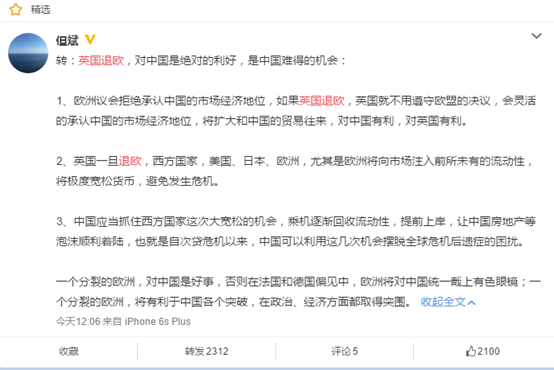
Dan Bin original Weibo post
“1. The European Parliament will refuse to recognize China’s market economy status. If Britain exits the European Union, Britain will no longer need to observe the resolution decided by EU. It can flexibly recognize China’s status and expand the trades with China. This is fruitful for both China and Britain.
2. Once Britain exits the EU, the western countries such as U.s, Japan, Europe, especially the Europe will inject unparalleled liquidity into the market. They will extremely loose the currency to avoid any crisis.
3. China should catch this opportunity to take back the liquidity, to go ashore and land the bubble of the Chinese real estate successfully. China can use this opportunity to get off the perplex from the sequel of the global financial crisis.”
In this comment, the publisher thinks that this is an opportunity for China to recuperate the domestic finance and expand the trades with Britain. He also says that this is a good thing to China, since the Europe always recognize China with prejudice due to France and Germany. A broken Europe will be benefit for China to seek for sally ports, in both politics and finance.
– But also, there are other voices that, once again, even being positive, are also MORE RATIONAL. From the comment of Ifeng news, there are 6 main effects towards China:
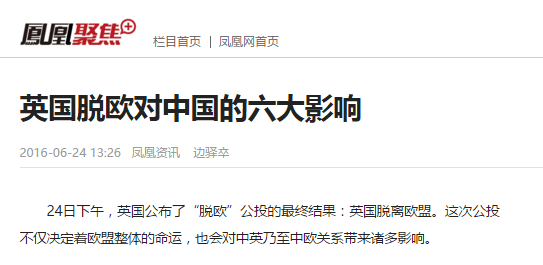
Ifeng comments on their website that have been forwarded through Weibo
“1. The students studying in Britain can save tens of thousands of dollars
If UK exits the EU, the exchange rate of Pound will crash. Thus, for people to study or travel in UK, it would be a bull. Citigroup estimates, if the British exits the European Union, the exchange rate between Pounds and U.S. dollar will fall by 10% to 20%. For the UK students, the one-year tuition would be 1.5 million pounds and living expenses would be 10000 pounds. Thus, they may save 2.4- 4.8 million yuan per year.
2. The devaluation pressure of China Yuan increases
If UK exits the EU, the exchange rate of Pound will crash. Although, for people to study or travel in UK, it would be a bull, for the short term foreign exchange market, the depreciation of sterling will lead to the appreciation of the dollar, and will cause the devaluation of the China Yuan towards the US dollar.
Economists said Britain’s leaving could make the financial market panic, leading to the capital outflows in mainland China, increasing the devaluation pressure, and challenging the monetary policy management of the central bank.
3. Yuan’s internationalization step will be disrupted
London has become the second largest offshore settlement center of China Yuan after Hong Kong. However, once the UK exits the European Union, the currency bonus will disappear. And the costs of strategy promotion in EU by Britain will also increase significantly. Chinese financial institutions need to consider dispersions to Paris, Frankfurt, Luxembourg and other places. This action will cost price.
4. Sino-EU trade cooperation will face a change
Some analysts believe that the economic impact of the British leaving EU may affect China ‘s exports, especially once the EU tend to adopt trade protectionist policies. Then, it will affect bilateral trade.
Once the UK exits the European Union successfully, the process to strengthen the strategic cooperation plans with the EU by the British will become difficult. The left is tantamount to breaking the invisible indirect cooperative ties between China and the EU, so that China had to choose other ways to press on with cooperation, and the impact from the various pre-bidding trade policies is also likely to be greatly reduced and become huge sunk costs .
5. No more ” the channel into Europe ” for Chinese enterprises
China has 500 million potential customers in the European market, however, due to protectionism, Chinese enterprises are often turned away. Britain is regarded as the most active countries within the EU which advocates free trade and investment liberalization. Thus, many Chinese companies will select the British as their production bases in Europe. And London will be recognized as a ” passage to Europe”. If Britain left the EU, may arise between the EU, the potential trade barriers between Britain and Europe will reduce the willingness of these enterprises to produce in UK. Some companies may choose to move to Brussels or Dublin, which are the areas have convenient and free market within the European Union.
6. Chinese people will be on the window period for overseas house purchasing
In recent months, international investors’ enthusiasm for commercial real estate investments in UK decreased significantly, while the sentiment increased. Some industry insiders predicted that once the United Kingdom exits the EU, the house prices in UK will fall down. When coupled with the depreciation of sterling, it will further promote the real estate market volatility, which would be an excellent “window period” for Chinese investors. Some industry insiders said that since the supply and demand relationship is still the main determinant of UK property currently, the UK house prices are still optimistic within the next five years and expected to increase about 25%. This would be more profitable for investors focusing on long-term profit.”
our conclusion
Although the SSE (Shanghai Stock Exchange) composite index fell by 1% when closed, the Chinese citizens and market now are still having a positive attitude towards this result. As per the Chinese, as what we mentioned before, they respect the choices of the British, and also their democratic rights, or at least that is what we could see on the digital walled garden build within China.
2Open at Territorio Creativo: China Business Overview
On Friday the 5th of February Luis Salvador Galán, the CEO of 2Open, went to give a speech to the well-known Spanish marketing consulting agency called “Territorio Creativo” (https://www.territoriocreativo.es/en/). Territorio Creativo was founded back in 1997 and it has had a huge development ever since. In 2005 its blog (TCBlog) was brought to life which later became to be one of the most influential blogs in the field, this helped and boosted the company to the highest relevant positions in the area. As for 2009, the company decided to focus more on Social Media Marketing and nowadays they operate in many different locations around the globe and have more than 100 employees.
Every Friday they organize a meeting during a breakfast session in which an expert shares experiences, expertise and knowledge with all the company’s members, this is usually held in the Madrid and Barcelona offices. They call it TcDesayunos. Luis S. Galán decided to share his Chinese experiences in the Digital Field and commentated on his personal vision about China’s landscape. Although he could have spoken about the development and best practices of 2Open, he opted for another approach and instead took the opportunity to share business experiences and receive brilliant ideas and comments from the audience.

The talk focused mainly on creativity, differences in politics, and the development of China in certain digital areas. The relation and contrast between creativity and freedom were discussed as well as advantages and disadvantages between the Spanish political system and the Chinese one. The huge development of mobile use and e-commerce in China was also a topic of discussion, since it has had a considerable growth in the past few years. The aim of this talk was mainly to give the Spanish audience a grasp of what the Chinese business environment looks like and where it is heading so they could get an idea of the so called “Chinese dream”.
If you wish to have a look at the article of Territorio Creativo about the session, and if you speak Spanish, here is the link to it: https://www.territoriocreativo.es/etc/2016/02/china-emperadora-del-ecommerce.html
This article was edited by Andres Arroyo Olson from 2Open.



